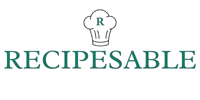TABLE OF CONTENTS:
- What is Mushroom Tea?
- Health Benefits of Mushroom Tea
- Ingredients and Equipment Needed
- How to Make Mushroom Tea
- Mushroom Tea Variations
- Side Effects and Precautions
- Recent Recipes
- FAQs About Mushroom Tea
How to Make Mushroom Tea: Step-by-Step Recipe, Benefits, and FAQs
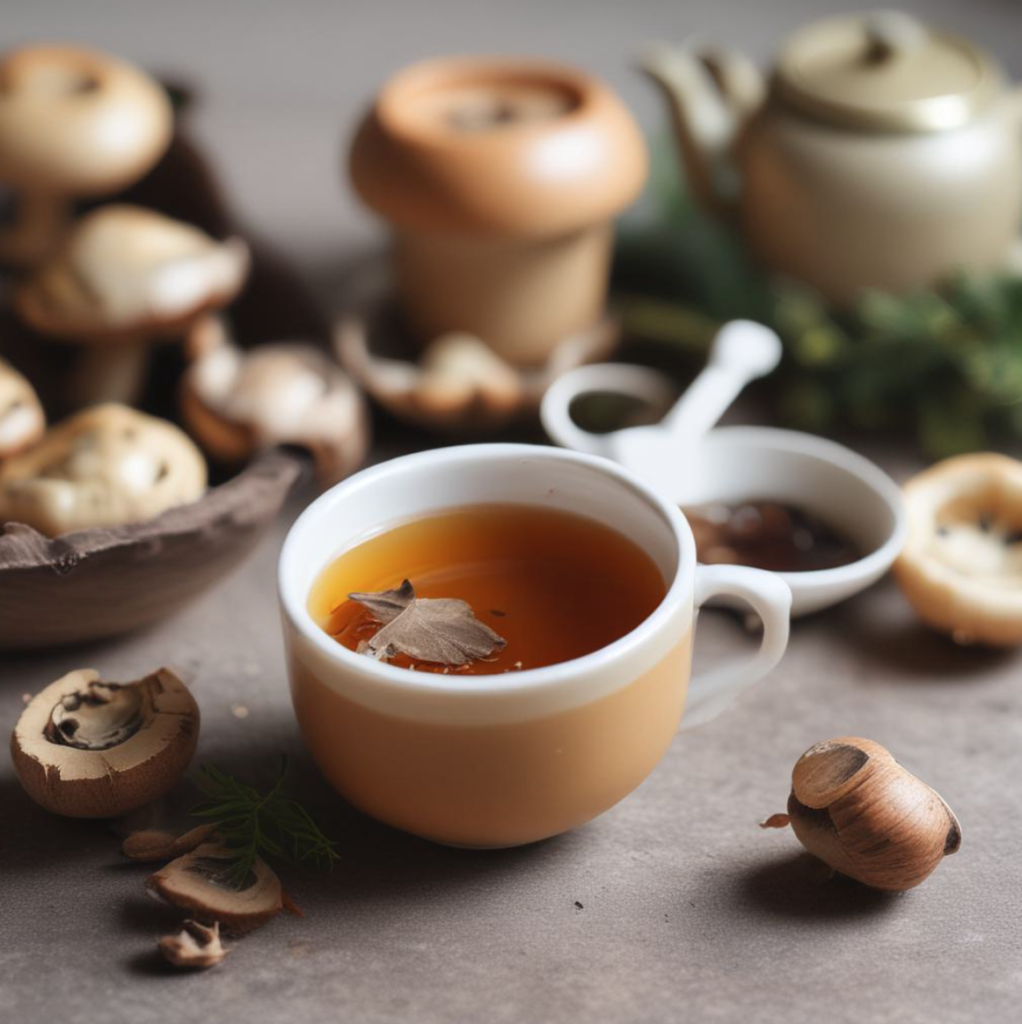
Mushroom Tea Recipe has been growing in popularity due to its wide range of health benefits and the unique properties of the mushrooms used in the brew. Whether you’re seeking an immune boost, mental clarity, or simply a comforting and nourishing drink, mushroom tea can be a fantastic addition to your daily routine.
In this guide, we’ll cover everything you need to know about making mushroom tea, its benefits, variations, and commonly asked questions to help you make the perfect brew. Whether you’re using Reishi, Chaga, or even Psilocybin mushrooms, this guide will walk you through a simple yet effective way to enjoy this ancient drink.
What is Mushroom Tea?
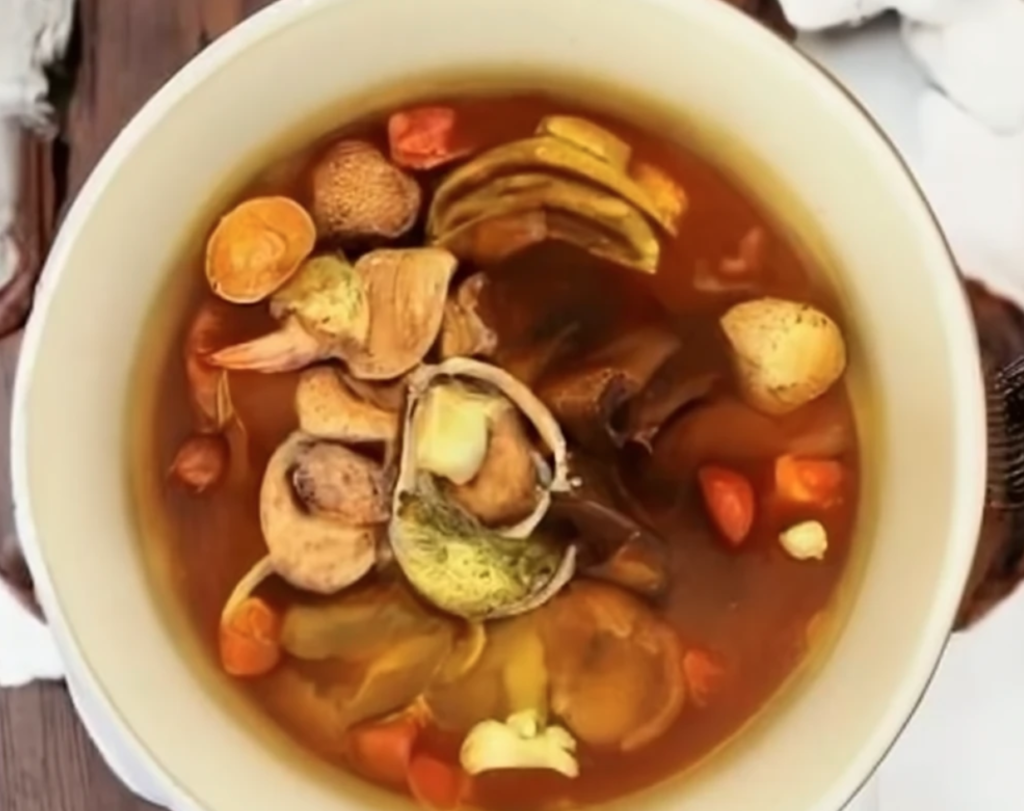
Mushroom Tea Recipe is a herbal infusion made from various medicinal mushrooms. These mushrooms, like Reishi, Chaga, Lion’s Mane, and Psilocybin, have long been used in traditional medicine for their therapeutic effects. Mushroom tea offers a simple way to consume these fungi, allowing their nutrients and medicinal compounds to be quickly absorbed into the body.
In modern times, Mushroom Tea Recipe has also become popular with those who microdose Psilocybin mushrooms for cognitive enhancement or mood regulation. The versatility of mushroom tea makes it an appealing option for a variety of health-conscious individuals.
Health Benefits of Mushroom Tea
Mushroom tea is revered for its numerous health benefits. Depending on the type of mushroom used, these benefits can range from boosting the immune system to improving mental clarity and reducing stress.
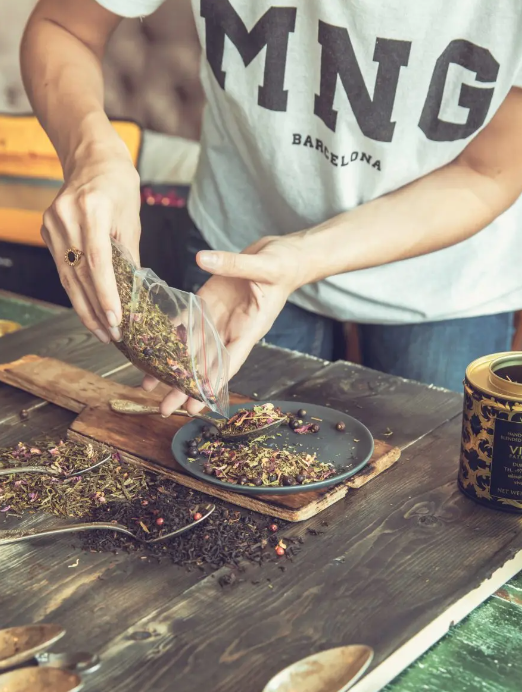
- Immune System Support: They contain beta-glucans, complex sugars that support immune function and help the body fend off pathogens.
- Cognitive Enhancement: Lion’s Mane is widely recognized for its neuroprotective properties. It has been shown to stimulate the production of nerve growth factor (NGF), which is crucial for brain health. Lion’s Mane tea is often consumed to improve memory, focus, and mental clarity.
- Stress Relief and Relaxation: Reishi, also known as the “mushroom of immortality,” has adaptogenic properties, meaning it helps the body adapt to stress. Drinking Reishi tea can promote relaxation, improve sleep, and enhance overall well-being.
- Antioxidant and Anti-inflammatory Properties: Both Chaga and Reishi are rich in antioxidants, which help combat oxidative stress and reduce inflammation in the body. Regular consumption of Chaga tea can aid in protecting the body from cellular damage.
- Mood Regulation: For those consuming Psilocybin mushrooms in tea form, mood regulation and emotional well-being are key benefits.
For more detailed insights into the health benefits of mushrooms, you can refer to this Complete guide to mushroom tea, which dives deep into the science behind these medicinal fungi.
Ingredients and Equipment Needed
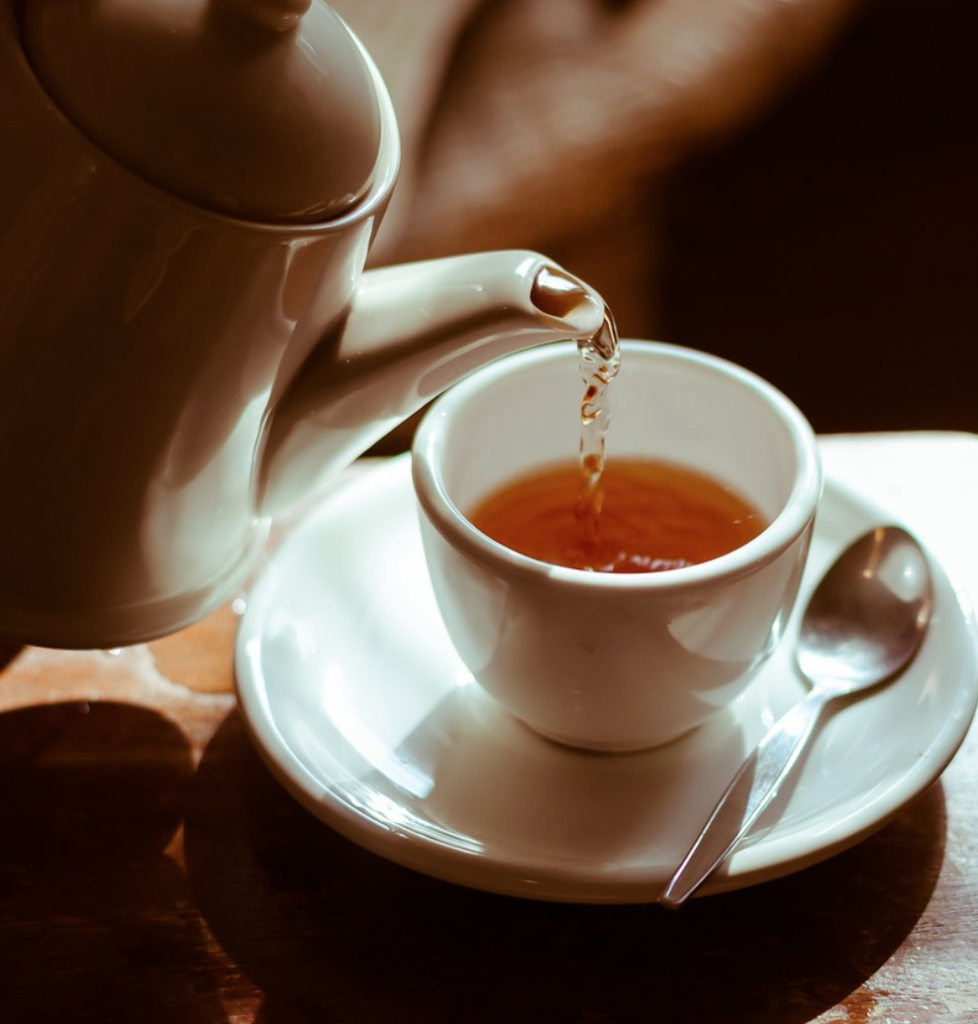
To make mushroom tea, you’ll need the following ingredients and tools:
- 1 cup of dried mushrooms (choose from Reishi, Chaga, Psilocybin, or Lion’s Mane)
- 2-3 cups of water
- 1 tablespoon lemon juice (optional, for taste and to aid in extracting active compounds from the mushrooms)
- Honey (optional, for sweetness)
- A tea kettle or pot for boiling water
- A strainer or cheesecloth to remove mushroom solids after brewing
How to Make Mushroom Tea
Now that you have your ingredients and equipment ready, let’s dive into the brewing process. Below is a step-by-step guide on how to make mushroom tea, whether you’re using dried mushrooms or fresh ones.
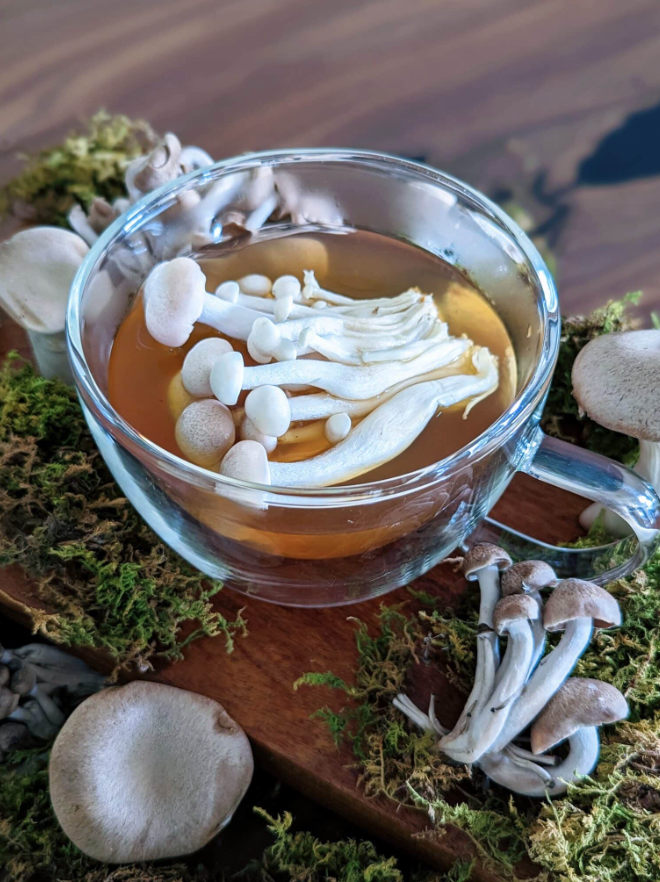
- Prepare the Mushrooms: If you’re using whole dried mushrooms, break them into smaller pieces. This increases the surface area, allowing for better extraction of the active compounds. If you’re using powdered mushrooms, you can skip this step.
- Boil the Water: In a tea kettle or pot, bring 2-3 cups of water to a rolling boil. The amount of water will depend on how strong you want your tea to be.
- Add the Mushrooms: Once the water is boiling, reduce the heat and add the mushrooms to the pot. Let the mushrooms simmer in the water for about 20 to 30 minutes. This slow simmer ensures that all the beneficial compounds from the mushrooms are extracted into the tea.
- Strain the Tea: After simmering, strain the tea using a fine mesh strainer or cheesecloth to remove the mushroom solids.
- Add Flavor Enhancers (Optional): Mushroom tea can have a somewhat earthy and bitter taste, particularly with Reishi or Chaga mushrooms. To improve the flavor, consider adding lemon juice or honey to the tea. Lemon can also aid in extracting active compounds like psilocybin when brewing tea with magic mushrooms.
- Serve and Enjoy: Pour the tea into a cup and enjoy it while hot. You can store any leftover tea in the refrigerator for up to 48 hours. Simply reheat it when you’re ready for another cup.
For alternative brewing methods, check out Mushroom tea brewing methods for more tips on how to perfect your brew.
Mushroom Tea Recipe Variations

Mushroom tea can be made with a variety of mushrooms, each offering its own unique benefits. Below are some of the most popular types of mushroom tea and their effects.
- Reishi Mushroom Tea: Known for its calming properties, Reishi tea is ideal for those looking to reduce stress and promote relaxation. It’s often consumed in the evening to aid in restful sleep. Try linking this with the Reishi Mushroom Soup Recipe for another way to use Reishi in your diet.
- Chaga Mushroom Tea: Chaga is packed with antioxidants and is renowned for its immune-boosting and anti-inflammatory properties. This tea has a more earthy flavor compared to other mushroom teas, but it’s highly effective for overall wellness. You can also check out this Chaga Smoothie Recipe for more ways to incorporate Chaga into your daily routine.
- Psilocybin Mushroom Tea: For those microdosing with Psilocybin, tea is an excellent way to consume this psychedelic mushroom. Microdosing involves taking small amounts of Psilocybin to improve mood, enhance creativity, and reduce anxiety.
- Lion’s Mane Tea: Known for boosting cognitive function, Lion’s Mane is a great choice for those looking to enhance memory, focus, and concentration. This tea can be consumed at any time of day, but many prefer it in the morning for a brain boost.
Side Effects and Precautions
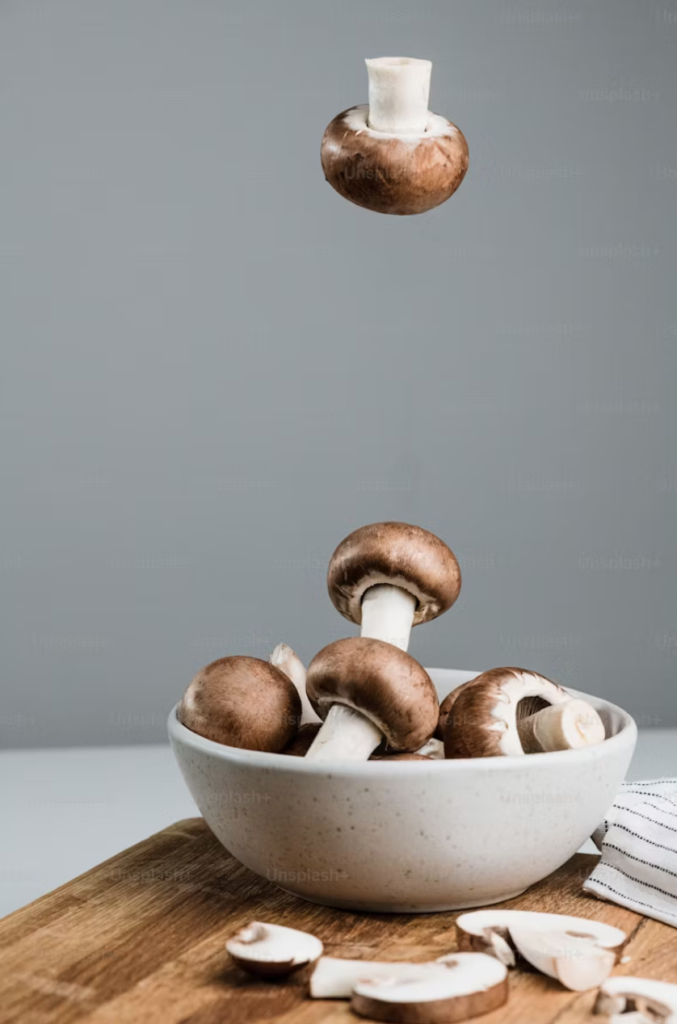
While mushroom tea is generally safe, it’s important to be mindful of potential side effects, especially when consuming larger doses or specific types of mushrooms like Psilocybin. Below are a few key considerations:
- Gastrointestinal Discomfort: Some mushrooms, like Reishi and Chaga, may cause mild stomach upset in some individuals, particularly when consumed on an empty stomach.
- Allergic Reactions: Although rare, some people may be allergic to certain mushrooms. If you’ve never consumed a particular type of mushroom before, start with a small dose to see how your body reacts.
- Psilocybin Precautions: If you are consuming Psilocybin mushrooms for their psychoactive effects, be aware of the legal status in your area, as these mushrooms are illegal in many places. Additionally, ensure you are in a safe and comfortable environment when consuming them to avoid any adverse reactions.
If you are pregnant, nursing, or taking medications, consult with your healthcare provider before incorporating mushroom tea into your routine.
Recent Recipes
FAQs About Mushroom Tea Recipe
How long does it take for mushroom tea to work?
The effects of mushroom tea can vary depending on the type of mushroom used. For Psilocybin mushrooms, the effects are typically felt within 30 minutes to an hour. With Reishi or Chaga, the benefits may be more subtle and cumulative over time.
Can you make mushroom tea with dried mushrooms?
Yes, dried mushrooms are commonly used for mushroom tea. Simply break the mushrooms into smaller pieces or use a powdered form for easy brewing.
How often should I drink mushroom tea?
The frequency of consumption depends on the type of mushroom. For Reishi or Chaga, daily consumption (1-2 cups per day) is often recommended for optimal health benefits. For Psilocybin, follow a microdosing schedule that works for you.
What does mushroom tea taste like?
Mushroom tea has an earthy, sometimes bitter flavor, especially when brewed with Reishi or Chaga mushrooms. Adding honey or lemon can help enhance the taste.
Is mushroom tea legal?
Mushroom tea made from Reishi or Chaga is legal in most countries. However, tea made from Psilocybin mushrooms, which are psychoactive, is illegal in many parts of the world. Always check local regulations before brewing Psilocybin tea.
